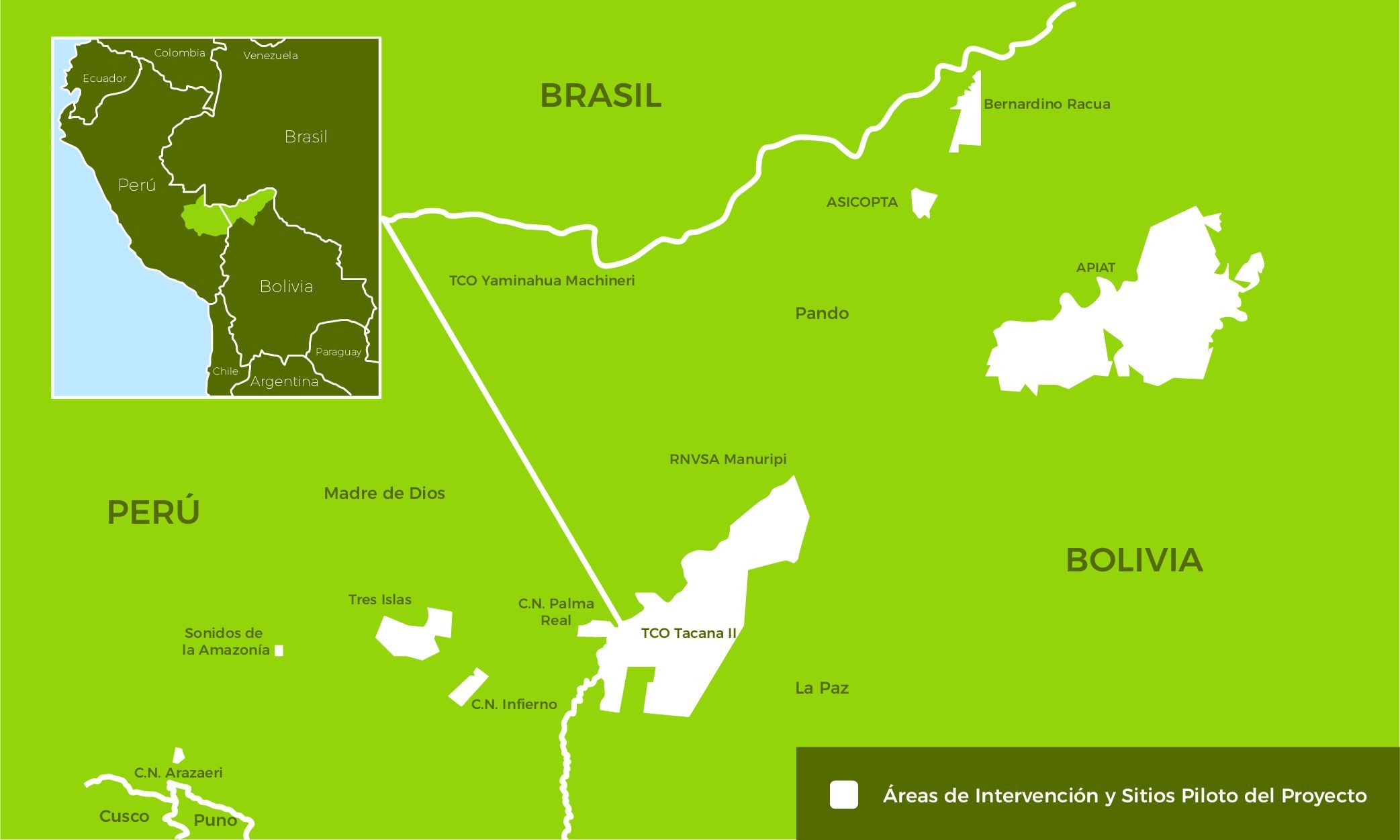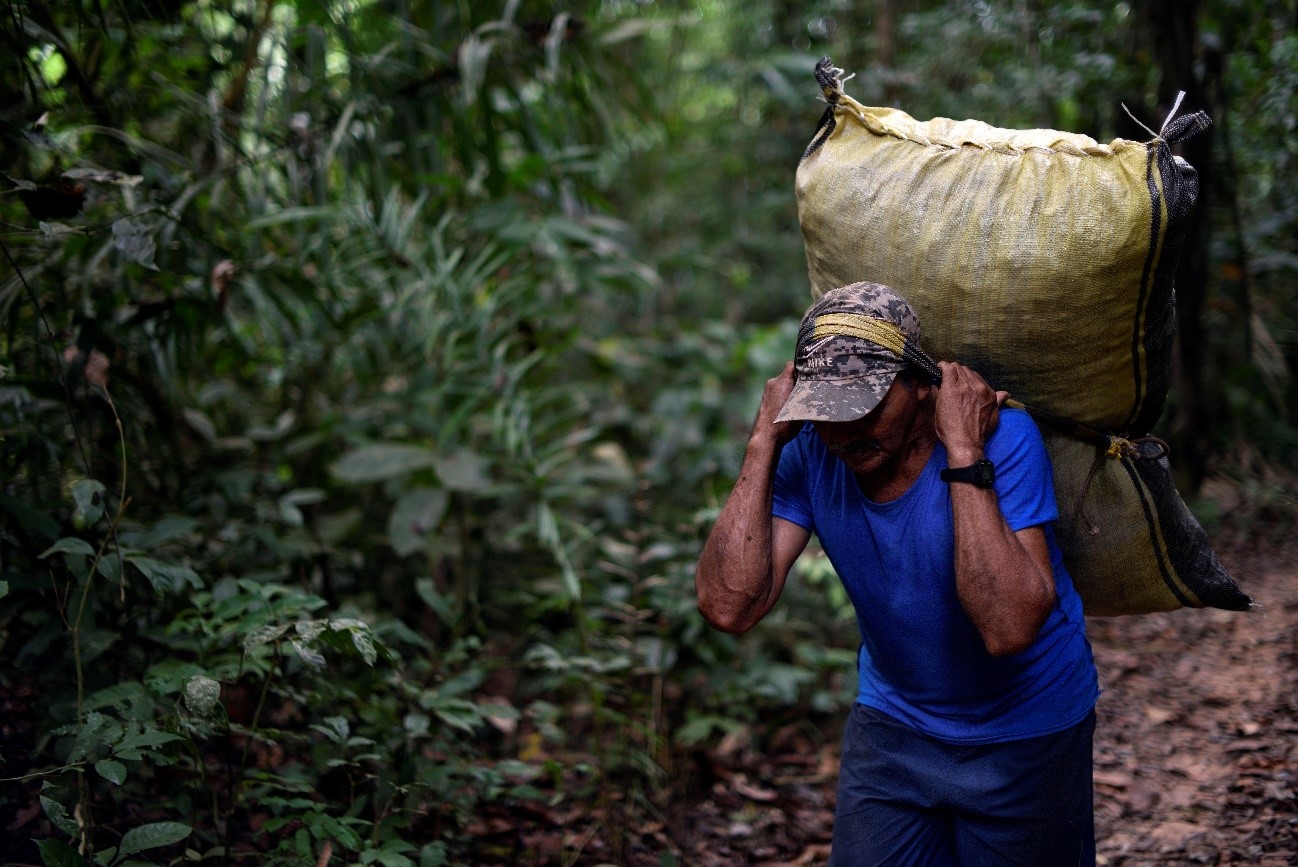The Amazon Forests and Climate Change project has generated models of climate-resilient community forest management that can be replicated in the Amazon.
21 October 2022. The lives of the inhabitants of the communities in the Madre de Dios basin, shared between Bolivia and Peru, cannot be conceived of without the close relationship they have with the Amazonian forests. These ecosystems provide crucial services for their food, health and economic development. Consequently, the harvesting and commercialisation of Amazonian fruits, such as Brazil nuts, acai and cocoa, are crucial, as they improve the livelihoods of local communities while contributing to forest conservation.
The families of the communities in the basin enter the forests, and follow different processes for the exploitation and commercialisation of the Amazonian fruits. In the case of the Brazil nut, the nuts are collected once they fall from the trees, and then split with the help of a machete to extract the seeds. To obtain the açaí, it is necessary to climb the palm trees, which can reach a height of more than 25 metres, in order to harvest the bunches, which are then shelled. The cocoa pods are harvested directly from the tree. The pods are then transported to processing or marketing centres.
The Amazon Forests and Climate Change project, implemented over three years (2019 - 2021) in Bolivia by the Bolivian Association for Research and Conservation of Andean-Amazonian Ecosystems (ACEAA-Conservación Amazónica) and the Amazonian University of Pando; and in Peru by the Association for the Conservation of the Amazon Basin (ACCA), has contributed to the development of integrated forest management models.
Find out where the project is located in Peru and Bolivia
 |
The primary focus of the project is the management of non-timber resources, which functions as an articulating axis of other components, such as local development, sustainable use and conservation of environmental functions. At the same time, it favours community adaptation to climate change and contributes to mitigation by promoting integrated management, including territorial governance, dialogue on community knowledge and know-how, and diversification of sustainable production systems.
One of the activities developed by the project consisted of identifying more than ten lessons learned by the communities related to the management of Amazonian fruits and their articulation with the development of adaptation and mitigation strategies in facing climate change. Based on these learnings, the project identified priority issues as well as solutions to address them. Some of the most important lessons learned are highlighted below:
- Strengthening processing capacities. Families working in the harvesting and collection of non-timber resources need to strengthen their capacities to improve the processing of the fruits. Although they have the knowledge related to the extraction of species such as Brazil nuts, açaí or cocoa, they still need to acquire knowledge and experience that will allow them to improve the processing of the fruits in order to optimise the benefits they generate
- Bridging the gaps in planning. It is important that indigenous and rural farming communities have the knowledge and capacity to develop their own planning instruments for the management of non-timber resources, as they generally depend on the support of external technicians, which represents an additional cost.
- Improving access to markets. Collecting and producing families often require intermediaries who, by linking communities with companies for the commercialisation of products, set the prices. This can lead to market distortions and unfavourable conditions for families
- Incentivising productive diversification. The sale of Brazil nuts can account for 50-70% of annual income in some communities. However, this dependence also makes them vulnerable if production is affected by climate change. It is therefore important to diversify sources of income. Making use of diverse fruits allows families to be more resilient to the effects of climate change.
"The methodology used to access the information was crucial to the research. We generated spaces for dialogue through workshops and analysed pre-existing data, with the direct participation of the collecting families, who are the main source of knowledge and reflection on the relationship established between the forests and the dynamics of the economy, food and health, says Luis Arteaga, technical director of ACEAA-Conservación Amazónica, on the rescue of the main lessons associated with the management of Amazonian fruits and climate change.
Subsequently, based on the lessons learned, four pilot experiences of the project were implemented:
- Açaí harvesting in Santa Rosa del Abuná (Bolivia)
- Brazil nut harvesting in the Tacana indigenous territory II (Bolivia)
- Brazil nut harvesting in the Palma Real Native Community (Peru)
- Cacao cultivation in the Infierno Native Community (Peru)
In these four pilot projects, work was done together with the producers to strengthen their capacity to plan and implement measures for the management of non-timber resources. Techniques for harvesting, collecting and transporting non-timber resources were optimised. In each experience, conditions were created to promote the primary transformation of forest fruits in the communities, with the aim of providing added value and strengthening the links between local enterprises and potential markets. Likewise, organic certification processes were promoted, and the following productive organisations were founded: Integral Association of Producers and Processors of Amazonian Fruits of Pando (AFAI Pando, Bolivia), and the Agroforestry Association of the Native Community Infierno (Peru).
In the production dynamics of Amazonian fruits, it is of utmost importance to promote the articulation with potential markets. With this in mind, market studies were carried out in the cities of La Paz and Santa Cruz de la Sierra, while at the same time promoting the articulation of local initiatives with the gastronomic sector in the country's main cities. In turn, eight alliances were achieved with restaurants in Bolivia, such as Gustu, Sabor Clandestino, Azafrán and Serena Morena, among others, with the aim of promoting the adoption of Amazonian fruits as ingredients for their dishes (the recipe books prepared by chefs using Amazonian fruits as main ingredients can be found on the observatory’s platform).
In the eagerness to promote the consumption of non-timber forest resources, the First Virtual Fair of Amazonian Fruits was held. This activity strengthened, created and refreshed the image of the more than 20 participating enterprises; promoted the development of communication skills and abilities in sales through the use of new information and communication technologies; and made contact with potential clients at the national level.
Ecosystem-based adaptation in Amazonian communities
In addition to consolidating value chains for some Amazonian fruits, actions were implemented to reduce the impacts of climate change. Diversification of livelihoods from forest resources was the main ecosystem-based adaptation measure promoted through the project. In addition, based on an analysis of the impacts of climate events on value chains, it was identified that the reduction of water in dry seasons negatively affects the production of non-timber forest resources, so specific actions were implemented such as the protection of water sources in transformation processes and the establishment of irrigation systems in agroforestry systems. An early warning system was also implemented to detect the reduction of fruit in the forest due to climatic events.
On the other hand, knowledge on forest management and climate change concepts was strengthened among members of Amazonian fruit enterprises and public officials in both countries. Active education techniques were applied in the training sessions, and educational texts and audiovisual material were designed. A total of 155 civil servants (78 women and 77 men) from 13 public entities and 268 members (138 women and 130 men) of 15 productive enterprises were trained.
"The dry season is more intense, and already we can no longer navigate the river and we are isolated in the community (...) when there is flooding we can't go out to get the Brazil nuts. That is why we decided, in the workshop, that each family will work half a hectare of crops to ensure food (...) and also that we must store food when we are able to buy it" Ángel Quimo, Toromonas Community Representative
 |
| Brazil nut harvesting in Santa Rosa del Abuná, Bolivia |
Benefits of the project for the Amazonian communities
The project was completed in December 2021 and some of the most important findings and outcomes for the communities are highlighted below.
- The main conclusion of the project was that livelihood diversification from the multiple resources of the forest is a key measure in reducing the vulnerability of communities to climate change.
- The four pilot projects supported the integrated management of more than 152,000 hectares of Amazonian forest, benefiting 312 families, consolidating their experiences in the use of forest resources and increasing their average income by 29%. In addition, applying CARE International’s Climate Vulnerability and Capacity Analysis methodology, it was identified that the level of vulnerability to climate change of the communities participating in the pilot experiences was reduced by 15%.
- The project's actions directly benefited 2366 people (1393 men and 973 women), including people linked to the initiatives evaluated, people from the communities participating in the pilot experiences, other associated enterprises, and public entities from both countries.
- A total of 1141 people were trained (687 men and 454 women), generating spaces for dialogue and participation in pilot experiences and productive initiatives. In addition, through fairs and networks, forest management and climate change concepts were socialised, reaching more than 27,000 people through various channels and formats, including a radio soap opera and a series of animated videos.
Potential for scaling up and replication of the Project
The scaling up of the project has been encouraged through support to regional networks that promote the management of non-timber resources. In Bolivia, the " Inter-Institutional Platform for the Articulation of Amazonian Fruit Production Complexes (PICFA)", whose mission is to be a representative body of public-private actors responsible for promoting public policy proposals and prioritising strategic programmes and projects for the development of Amazonian fruit complexes. Support was also given to holding the " Business Forum Towards the Integration of Madre de Dios - Pando", whose objective was to foster the exchange of experiences to promote the cross-border integration process between Peru and Bolivia.
"The communities are betting on strengthening the use of Brazil nuts and increasing income through other forest resources, which is the main adaptation measure, valuing the standing forest, thus also contributing to climate change mitigation. We have rescued lessons learned from existing initiatives, we have also implemented pilot experiences, implemented monitoring systems, which has led to the establishment of an Observatory of Amazonian Fruits and Climate Change", emphasised Luis Arteaga.
Expansion of the project - Observatory on Amazonian Fruits and Climate Change
By sharing the information and data obtained from the implementation of the "Amazonian Forests and Climate Change" project, ACEAA and UAP structured a complementary project: “Implementing the Observatory of Amazonian Fruits and Climate Change”, which was developed in Bolivia during 2021. This expansion responds to the objective of contributing to the Nationally Determined Contributions (NDC) of the forest sector in Bolivia, through integrated and sustainable management models of the Amazon Forest. This will be done through the design and installation of an observatory of Amazonian fruits and climate change that is linked to the Inter-Institutional Platform for the Articulation of Amazonian Fruit Production Complexes (PICFA).
The objective of the Amazonian fruits observatory project is to consolidate itself as a source of information on the main forest resources and climate change scenarios for collectors, decision-makers and technical assistance institutions. The observatory also constitutes a digital repository of information on Amazonian fruits, and makes available more than 1,400 documents.
"The greatest achievement of the project is to be able to insert the initiatives and producers related to Amazonian fruits in the use of technology that provides them with inputs and helps them to optimise the processes in their productive activities," says Daniel Larrea, ACEAA's Science and Technology Coordinator.
Larrea stresses that "traditionally, academia has always been separated from productive processes and the case of Pando is no exception, however, the Observatory has allowed for the generation of an articulation between academia, productive initiatives and decision-makers".
The project is linked to NDCs in the forest sectors, mainly linked to integrated and sustainable forest management.
Contribution to the NDCs in Bolivia and Peru
Both the "Amazonian Forests and Climate Change” project and the “Implementing the Observatory of Amazonian Fruits and Climate Change” project contribute to 5 points of Bolivia's NDC, and to 6 points of Peru's NDC. The indicators reported by the project are directly related to some NDC targets in both countries. These include the number of hectares under integrated and sustainable forest management, percentage of rural and native communities that implement strategic production chains to reduce the risks of climate change, number of beneficiaries that strengthen their capacities in the use of appropriate technologies for the management and sustainable use of forests, among others.
The "Amazon Forests and Climate Change" project worked on generating pilot experiences, which constitute models to be scaled up. It is important to recognise that beyond the direct quantification of its contribution to the reporting of NDC indicators, the greatest impacts will be generated by replicating and scaling up the actions in other sites and at different levels. The possibility of scaling up is further increased with the implementation of the "Observatory of Amazonian Fruits and Climate Change".
DATA:
- The Amazonian Forests and Climate Change project is implemented by the Bolivian Association for the Investigation and Conservation of Andean-Amazonian Ecosystems (ACEAA-Bolivia), the Association for the Conservation of the Amazon Basin (ACCA-Peru) and the Amazonian University of Pando (UAP-Bolivia). It is part of the "Forests, Biodiversity and Ecosystems" sector of the EUROCLIMA+ programme, implemented by the agencies Expertise France (EF) and the German Society for International Cooperation (GIZ) GmbH. Learn more about the the project.
Articles published about the project
- Meeting between projects and new authorities of the Plurinational State of Bolivia
- Ten lessons on sustainable forest management in bosques in Bolivia and Peru
Documents and publications
- Compendium Amazon Forests and Climate Change
- Radio soap opera “Heartbeats of the Amazon”
- Video: The story of Tomás Espinoza, Brazil nut collector
- Video: The Biodiversity
- Video: Climate Change and Amazonia
- Video: Resources of the Amazonian Forest
- Video: Lessons learned from 12 ventures in the Madre de Dios basin
About EUROCLIMA+
EUROCLIMA+ is a programme funded by the European Union and co-financed by the German Federal Government through the Federal Ministry for Economic Cooperation and Development (BMZ), as well as by the governments of France and Spain. Its objective is to reduce the impact of climate change and its effects in 18 Latin American and Caribbean countries by promoting climate change mitigation and adaptation, resilience and investment. The Programme is implemented under the synergistic work of seven agencies: the Spanish Agency for International Development Cooperation (AECID), the French Development Agency (AFD), the Economic Commission for Latin America and the Caribbean (ECLAC), Expertise France (EF), the International and Ibero-America Foundation for Administration and Public Policy (FIIAPP), the German Society for International Cooperation (GIZ) GmbH, and the UN Environment Programme.
Contact for more information: This email address is being protected from spambots. You need JavaScript enabled to view it.




